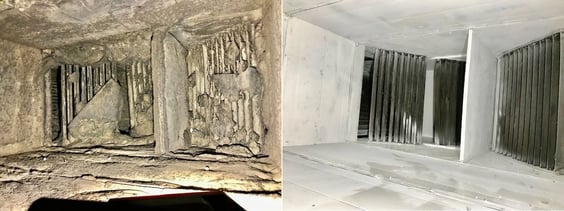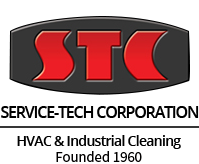By Service-Tech Corporation on Jan 25, 2022 9:00:00 AM
Fiberglass-lined ductwork is commonly used in many commercial heating, ventilation, and air conditioning (HVAC) systems. Fiberglass air duct liner provides:
Over time, fiberglass-lined ductwork gets exposed to different levels of air turbulence, temperature, and humidity. All of which take a toll on the duct liner by breaking down its primary seal. This deterioration of the insulation coating spreads through the ventilation system, leaving deposits within HVAC components, and enters the indoor air.
Deteriorating fiberglass air duct liner is a common cause of indoor air quality (IAQ) complaints and adverse health effects. Health effects from exposure to fiberglass can vary depending on the size of the fiber and type of exposure. At a minimum, fiberglass is an acute physical irritant to the skin, eyes, and upper respiratory tract.
Read More – Why Commercial HVAC and Air Duct Cleaning is a Great Investment
Before new technologies were developed to safely clean and restore fiberglass-lined air ducts, these systems were either replaced with new ductwork, or the damaged insulation was removed and replaced with new insulation at a significant cost. Fortunately, these systems can now be restored through professional air duct cleaning.
Fiberglass-lined or not, preventative maintenance and cleaning are always recommended for all ductwork. The best way to ensure proper airflow and IAQ is to follow a regular maintenance schedule. This, along with a high-efficiency filtration system, assures protection of both HVAC system components and building occupants. Maintenance procedures can include inspection, detection, and remediation of probable sources of airborne contaminants and moisture.

Prevention is the most desirable solution. In some cases, however, it may be too late, and commercial air duct cleaning is necessary. If air duct cleaning is necessary, HVAC cleaning professionals must be familiar with National Air Duct Cleaners Association (NADCA) guidelines.
Today’s air duct insulations are designed to withstand the rigors of fiberglass-lined cleaning. Fiberglass-lined ductwork and duct board products have surfaces that are resistant to the type of abuse that occurs during air duct cleaning.
Fiberglass-lined cleaning is a delicate process because of the possibility of glass particulates dislodging and escaping into the HVAC system, putting building occupants at risk.
To prevent this from happening, service technicians are highly trained to safely and properly clean fiberglass-lined ducts using HEPA (high-efficiency particulate air-filter) vacuums. With this method, there is direct contact between the brush head and the interior of duct surfaces to dislodge and remove dirt and debris.
The air washing method brings compressed air into the duct through a hose terminated with a “skipper” nozzle. This nozzle is designed so that the compressed air propels it inside the duct while removing dirt and debris. As the dislodged dirt and debris become airborne, they’re drawn downstream through the duct and out of the system by the vacuum collection equipment.
The power brushing method involves the use of pneumatically or electrically powered rotation bristle brushes to loosen dirt and debris, which are drawn downstream into a vacuum cleaner. Only flexible bristle brushes should be used so that duct walls or insulation surfaces don’t get damaged.
After removing dirt and contaminants from the fiberglass, your HVAC cleaning technicians have the capability to apply a coating, if needed, which prevents fibers from fraying or loosening and inhibits the growth of mold, mildew, and bacteria. In addition, the sealant creates a bond with the surface of the ductwork to further prohibit particles from entering the airstream. These antimicrobial coatings can also be applied to bare metal surfaces of unlined metal ductwork for long-term fungicidal activity with no loss of activity on aging.
Service-Tech Corporation specializes in guaranteed techniques in air duct cleaning with contact vacuuming and source removal in our air purification process, including the use of HEPA vacuums.
While most residential and commercial air duct cleaning companies simply clean as far as they can reach into the ductwork, our certified technicians use manual entry to effectively reach and clean those hard-to-get-at areas within your ducts and HVAC system.
Minimize machine downtime and maintain a clean and safe environment for your employees with an HVAC cleaning partner backed by a history built on hard work, integrity, and a commitment to excellent service. Contact us today.
Minimize machine downtime and maintain a clean and safe environment for your employees with an HVAC system cleaning partner backed by a history built on hard work, integrity and a commitment to excellent service. Let’s talk about a cleaner, healthier environment.
